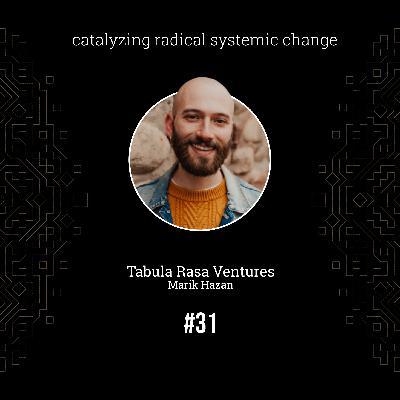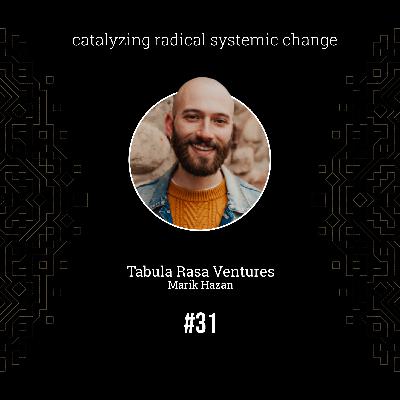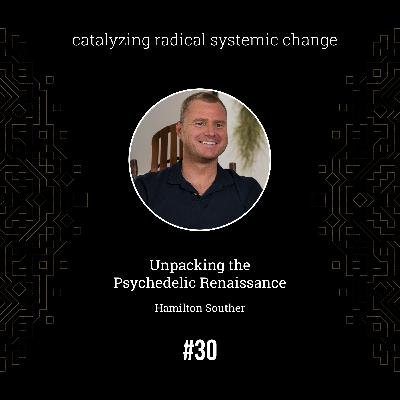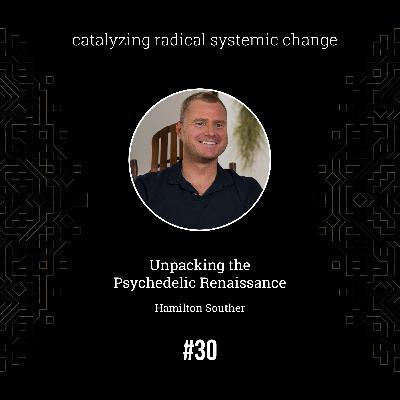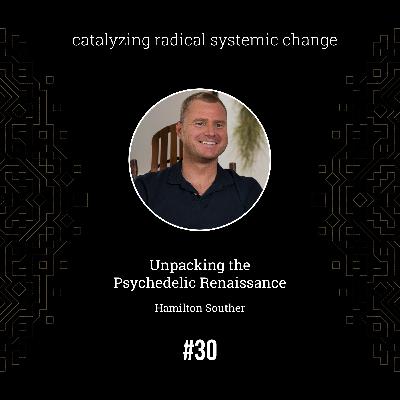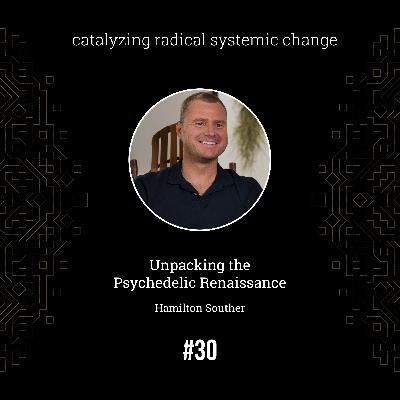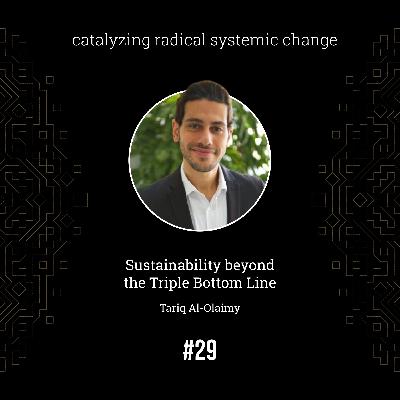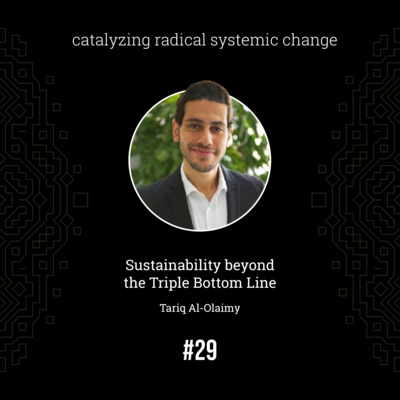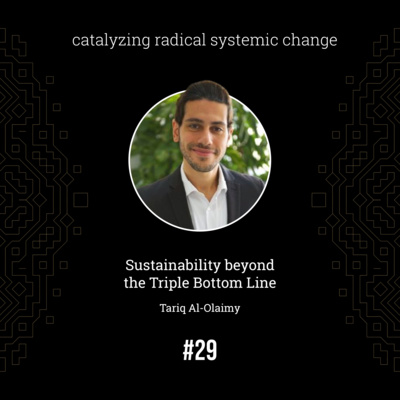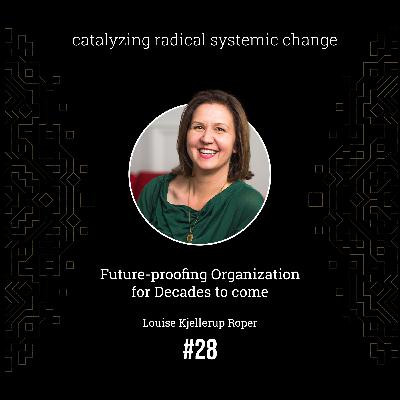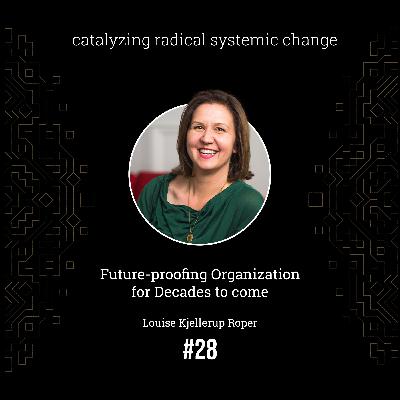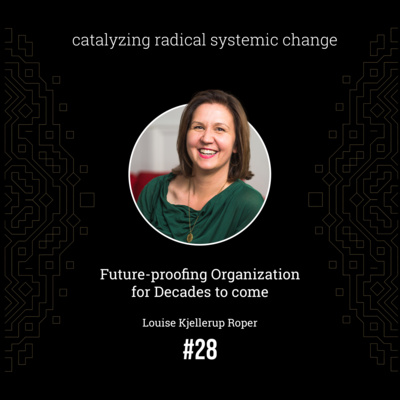Discover Catalyzing Radical Systemic Change - voted the No. 1 podcast on Systemic Change on Apple podcasts
Catalyzing Radical Systemic Change - voted the No. 1 podcast on Systemic Change on Apple podcasts

Catalyzing Radical Systemic Change - voted the No. 1 podcast on Systemic Change on Apple podcasts
Author: Alistair Langer
Subscribed: 3Played: 25Subscribe
Share
© Alistair Langer
Description
Without us knowing exactly how, the transition towards a planetary civilization within our lifetime is not only necessary, it’s possible. Welcome to a series of mapping, discovering and cross pollinating the various building blocks that catalyze radical systemic change. Drop out of the collective agenda setting that we are heading towards dystopia. Drop out of your own fears that withhold you from living your full potential. In our hearts we all share the precise knowledge that a life divine on on this planet is our joint destiny. Tune into the frequency of abundance, creativity, joy & love.
217 Episodes
Reverse
Millions of digital nomads live a life many aspire to. The numbers are hard to quantify, but the statistics speak for 16 million digital nomads from the US alone. And over 35 million at least worldwide. And the numbers - especially during and after the pandemic keep rising sharply. They are anticipated to grow to 1 billion people working remotely by 2035. Most of us share the dream of working and living remotely for at least a couple of months per year. And some dream of living in a community as a way of life. In this episode, we will deep dive into Cohere - The Future of Living with Dakotah Apostolou.
The question then becomes - how can we create a regenerative business model that serves the many generations after us, whilst enjoying a life free of the constraints most of us don’t want to endure anymore? Who out there really wants to spend more time in an office than really needed?
How can we create incentive mechanisms that create a commons based around food security, water, and being surrounded by inspiring people?
These are some of the questions that we are going to explore in today’s podcast around Cohere - the next generation of a community co-owned cooperative that aims to precisely solve at least some of the questions many of us ponder over.
Why the name Cohere?
What’s exactly the niche that you’re focusing on?
Why connect change makers, social entrepreneurs, and change agents?
What’s the broader ecosystem or meta-network that you want to serve with Cohere?
What are you trying to do differently than other players in the market serving the needs of digital nomads? Please differentiate yourself from the other players in the market.
How do you make sure you give back to the local, indigenous communities, where normally most of the value added is extracted from? How do you create an incentive mechanism that includes them?
Every start-up has to start somewhere. Please sketch your involvement in
Costa Rica
Berlin
Guatemala
Peru
Ecuador
Colombia
What about Cohere excites you most?
Let’s take a deep dive into the Web3 part and the tokenomics behind Cohere
Let’s disentangle the tokenomics from the broader Crypto market!
Where do you see the biggest potential in the market?
Finally, for the crucial junction in history we find ourselves in, what are the contributions and the leverage Cohere provides for the broader ecosystem?
Dakotah Joseph Apostolou is a designer of buildings, networks, and businesses. As an instigator of community, his passion is applying design thinking to create regenerative systems for the physical environment as well as inspiring collaboration between people and businesses. The latest expression of this is through his work with Cohere, a global network of member-owned coliving communities that blur the lines between work, life, and travel.
Graduating top of his class at Taliesin, the Frank Lloyd Wright School of Architecture, Dakotah embodies the ethos of Wright by virtue of his commitment to developing financially accessible human settlements that connect people to the natural world while restoring the health of the local ecosystem and communities.
https://www.cohere.network
How can we create incentive mechanisms that create a commons based around food security, water, and being surrounded by inspiring people?
These are some of the questions that we are going to explore in today’s podcast around Cohere - the next generation of a community co-owned cooperative that aims to precisely solve at least some of the questions many of us ponder over.
The question then becomes - how can we create a regenerative business model that serves the many generations after us, whilst enjoying a life free of the constraints most of us don’t want to endure anymore? Who out there really wants to spend more time in an office than really needed?
Millions of digital nomads live a life many aspire to. The numbers are hard to quantify, but the statistics speak for 16 million digital nomads from the US alone. And over 35 million at least worldwide. And the numbers - especially during and after the pandemic keep rising sharply. They are anticipated to grow to 1 billion people working remotely by 2035. Most of us share the dream of working and living remotely for at least a couple of months per year. And some dream of living in a community as a way of life. In this episode, we will deep dive into Cohere - The Future of Living with Dakotah Apostolou.
The notion is that the huge demand for psychedelic experiences comes with a lot of second and third-order effects and unintended consequences. To name but a few: Psychedelic tourism leads to endangering the very species the ceremonies rely on, and a lot of the sacred medicines, from Ayahuasca to Peyote are threatened by extinction. The psychedelic sacraments are in danger in consumerist societies being abused instead of unlocking their potential.
Why psychedelics at all? Why do we think a focus on legalizing psychedelics has a crucial role to play in the omni-crises we face?
Why did you choose the name Tabula Rasa Ventures?
The ecosystem from Tabula Rasa Ventures, Energia Foundation, and Psyched Conference.
How do we make sure to give back to the indigenous communities, where ultimately most of the knowledge is conserved?
How do you make sure you don’t create just another wave of extractive business models that usurp the healing potential and make way for business à la Big Pharma?
Where is the biggest potential in the market?
Define the coordination challenge - and why and how that is linked to collective healing and solving the largest existential threats, and why that links to psychedelics.
Finally, a question that I’ve already asked a couple of times in the podcast: What can we do to prevent spiritual bypassing, spiritual materialism, and spiritual narcissism? Especially in the last years, instead of people getting “rid” of their egos, I see supercharged egos, using micro-dosing to quench the last bit of efficiency and genius in work life.
Marik Hazan
is an engineer, advocate, entrepreneur, and investor who has worked across “counter-culture” industries. He founded the first incubator focused on psychedelic startups and runs the world’s largest psychedelics conference, Psyched. He is the founding partner of Tabula Rasa Ventures, the premiere accelerator fund for early-stage psychedelic companies, and is the CEO of Energia Holdings Inc., an organization building the future of health by turning healthcare’s blindspots into preventative care solutions.
Finally, a question that I’ve already asked a couple of times in the podcast: What can we do to prevent spiritual bypassing, spiritual materialism, and spiritual narcissism? Especially in the last years, instead of people getting “rid” of their egos, I see supercharged egos, using micro-dosing to quench the last bit of efficiency and genius in work life.
Marik Hazan
is an engineer, advocate, entrepreneur, and investor who has worked across “counter-culture” industries. He founded the first incubator focused on psychedelic startups and runs the world’s largest psychedelics conference, Psyched. He is the founding partner of Tabula Rasa Ventures, the premiere accelerator fund for early-stage psychedelic companies, and is the CEO of Energia Holdings Inc., an organization building the future of health by turning healthcare’s blindspots into preventative care solutions.
How do you make sure you don’t create just another wave of extractive business models that usurp the healing potential and make way for business à la Big Pharma?
Where is the biggest potential in the market?
Define the coordination challenge - and why and how that is linked to collective healing and solving the largest existential threats, and why that links to psychedelics.
The notion is that the huge demand for psychedelic experiences comes with a lot of second and third-order effects and unintended consequences. To name but a few: Psychedelic tourism leads to endangering the very species the ceremonies rely on, and a lot of the sacred medicines, from Ayahuasca to Peyote are threatened by extinction. The psychedelic sacraments are in danger in consumerist societies being abused instead of unlocking their potential.
Why psychedelics at all? Why do we think a focus on legalizing psychedelics has a crucial role to play in the omni-crises we face?
Why did you choose the name Tabula Rasa Ventures?
The ecosystem from Tabula Rasa Ventures, Energia Foundation, and Psyched Conference.
How do we make sure to give back to the indigenous communities, where ultimately most of the knowledge is conserved?
To name but a few: Psychedelic tourism leads to endangering the very species the ceremonies rely on, and a lot of the sacred medicines, from Ayahuasca to Peyote are threatened by extinction. The psychedelic sacraments are in danger in consumerist societies being abused instead of unlocking their potential.
There are a lot of phony gurus and curanderos around in the market. And the market is very opaque - mainly, obviously also due to the fact that in many countries working with the sacred sacraments is illegal. A lot of people sell shortcuts to healing and enlightenment. There is little interest in setting standards, procedures, processes, and a culture of care - and instead, the market forces are taking over, creating the next gold rush.
What are key learnings working as a coach and spiritual guide in the last years?
What are the pitfalls?
What are the lessons and iterations in teaching?
How to summarize the correct approach?
How did you make an inventory of your own teachings?
We see a huge wave of people doing plant medicine but I personally see too little integration into everyday life, and also way too few offers in terms to integrate those peak experiences. Also, truly we need preparation for these intense, transformational spaces to really stick.
Let’s dive deep into the psychedelic renaissance:
What are ways to create conscious capitalism and awaken people that have leverage?
How can we out-innovate capitalism?
What can we do to prevent spiritual bypassing, spiritual materialism, and spiritual narcissism? Especially in the last years, instead of people getting “rid” of their egos, I see supercharged egos, using micro-dosing to quench the last bit of efficiency and genius in work life.
How is the conscious use of psychedelics and Web3 interlinked?
How can we encode mutually beneficial values of exchange that represent the myriad of different flows?
How can we create the next evolution of the internet?
How can we codify the linguistics of the visionary realms into code for blockchain and ERC20 tokens?
How can we unlock the value of creativity?
Hamilton Souther
is a business leader, sacred plant psychedelic influencer, podcaster, and entertainment innovator, blockchain innovator and platform creator. He is motivated by social purpose with experience in founding and leading a USA 501c3 charitable organization.
https://www.gaialabs.io
https://fullstock.io
https://www.liquidearth.io
https://bluemorphotours.com
How is the conscious use of psychedelics and Web3 interlinked?
How can we encode mutually beneficial values of exchange that represent the myriad of different flows?
How can we create the next evolution of the internet?
How can we codify the linguistics of the visionary realms into code for blockchain and ERC20 tokens?
How can we unlock the value of creativity?
Let’s dive deep into the psychedelic renaissance:
What are ways to create conscious capitalism and awaken people that have leverage?
How can we out-innovate capitalism?
What can we do to prevent spiritual bypassing, spiritual materialism, and spiritual narcissism? Especially in the last years, instead of people getting “rid” of their egos, I see supercharged egos, using micro-dosing to quench the last bit of efficiency and genius in work life.
To name but a few: Psychedelic tourism leads to endangering the very species the ceremonies rely on, and a lot of the sacred medicines, from Ayahuasca to Peyote are threatened by extinction. The psychedelic sacraments are in danger in consumerist societies being abused instead of unlocking their potential.
There are a lot of phony gurus and curanderos around in the market. And the market is very opaque - mainly, obviously also due to the fact that in many countries working with the sacred sacraments is illegal. A lot of people sell shortcuts to healing and enlightenment. There is little interest in setting standards, procedures, processes, and a culture of care - and instead, the market forces are taking over, creating the next gold rush.
What are key learnings working as a coach and spiritual guide in the last years?
What are the pitfalls?
What are the lessons and iterations in teaching?
How to summarize the correct approach?
How did you make an inventory of your own teachings?
We see a huge wave of people doing plant medicine but I personally see too little integration into everyday life, and also way too few offers in terms to integrate those peak experiences. Also, truly we need preparation for these intense, transformational spaces to really stick.
When we take a look at sustainability through the lens of the Bell curve, where can we sense the biggest leverage for the decades ahead? Is it more in the realm of adoption and mainstreaming of less bad (like saving energy, and carbon) behavior in business? Or is it rather in radically rethinking business models at the core?
Some of the examples of Tariq's work
that are outstanding in their ripple effects across sectors
that have the potential to build templates for other projects, as to massively scale
and finally, some examples that failed, and also why?
We dive deep into the concepts of de-growth, post-growth, decolonizing growth, reciprocal stewardship, and beyond species.
What do “Public-Planet-Partnerships” mean?
Where are business models in place that are already exemplary for the regenerative paradigm? And if so, in which sectors? And that can scale.
Let’s talk about system demonstrators. Let’s imagine for a moment we could choose some bioregions in the world where together with legislators, business leaders, and new technology we could showcase that the regenerative paradigm truly works in action. What would be a scale in action that would be sufficiently big enough to showcase? Yet small enough of a sandbox to allow for failure - which obviously is very much needed when we are sailing into uncharted territory.
Finally, what do we think are the necessary steps toward a planetary civilization ahead? Taking into account the leverage points that unlock through the role at 3BL but also through the other organizations and adjacent networks where we can make a difference.
Tariq Al-Olaimy
is Co-founder of a global ecosystem of social and planetary systems enterprises, including 3BL Associates, Diversity on Board, Recipes for Wellbeing, and Public-Planet Partnerships. He is among the first 100 certified biomimicry specialists in the world, with a diverse educational background in degrowth, post-growth economics, exponential innovation, investment & financial risk management, and spiritual ecology. Tariq has held advisory board, and co-chair roles with organizations such as the World Economic Forum, UNESCO, EAT Foundation, and Greenpeace MENA (Ummah for Earth). He is Ubuntu peer peace coach and community leader with a decade of experience within international climate movements. He is an experienced speaker, having conducted training and workshops across six continents to over 120+ nationalities. He is featured in publications such as The New York Times, The Guardian, Al Jazeera, and Stanford Social Innovation Review. He was host of the Dubai Expo 2020 ‘People and Planet’ Podcast. Also he is fellow of the Royal Society of Arts (FRSA), and has received multiple global awards and recognitions for leading projects that contribute toward the UN Sustainable Development Goals.
https://www.3blassociates.com
Let’s talk about system demonstrators. Let’s imagine for a moment we could choose some bioregions in the world where together with legislators, business leaders, and new technology we could showcase that the regenerative paradigm truly works in action. What would be a scale in action that would be sufficiently big enough to showcase? Yet small enough of a sandbox to allow for failure - which obviously is very much needed when we are sailing into uncharted territory.
Finally, what do we think are the necessary steps toward a planetary civilization ahead? Taking into account the leverage points that unlock through the role at 3BL but also through the other organizations and adjacent networks where we can make a difference.
We dive deep into the concepts of de-growth, post-growth, decolonizing growth, reciprocal stewardship, and beyond species.
What do “Public-Planet-Partnerships” mean?
Where are business models in place that are already exemplary for the regenerative paradigm? And if so, in which sectors? And that can scale.
When we take a look at sustainability through the lens of the Bell curve, where can we sense the biggest leverage for the decades ahead? Is it more in the realm of adoption and mainstreaming of less bad (like saving energy, and carbon) behavior in business? Or is it rather in radically rethinking business models at the core?
Some of the examples of Tariq's work
that are outstanding in their ripple effects across sectors
that have the potential to build templates for other projects, as to massively scale
and finally, some examples that failed, and also why?
When we take a look at sustainability through the lens of the Bell curve, where is the most significant leverage for the decades ahead? Is it more in the realm of adoption and mainstreaming of less bad (like saving energy, and carbon) behavior in business? Or is it rather in radically rethinking business models at the core?
When we look at the state of affairs of a world in multi-crises or Omni-crises, how can we make a case for sustainability? Sustainability is still seen as an add-on, as something that is “nice to have” but we “can’t afford it now”?
What examples of business models are already exemplary for the regenerative paradigm? And if so, in which sectors?
Let’s talk about system demonstrators. Let’s imagine for a moment we could choose some bioregions in the world where together with legislators, business leaders, and new technology we could showcase that the regenerative paradigm truly works in action. What would be a scale in action that would be sufficiently big enough to showcase? Yet small enough of a sandbox to allow for failure - which obviously is very much needed when we are sailing into uncharted territory.
Finally, what are the necessary steps toward a planetary civilization ahead? Taking into account the leverage points that you can unlock through Volans but also through the adjacent networks that make a difference.
Let’s talk about system demonstrators. Let’s imagine for a moment we could choose some bioregions in the world where together with legislators, business leaders, and new technology we could showcase that the regenerative paradigm truly works in action. What would be a scale in action that would be sufficiently big enough to showcase? Yet small enough of a sandbox to allow for failure - which obviously is very much needed when we are sailing into uncharted territory.
Finally, what are the necessary steps toward a planetary civilization ahead? Taking into account the leverage points that you can unlock through Volans but also through the adjacent networks that make a difference.
When we look at the state of affairs of a world in multi-crises or Omni-crises, how can we make a case for sustainability? Sustainability is still seen as an add-on, as something that is “nice to have” but we “can’t afford it now”?
What examples of business models are already exemplary for the regenerative paradigm? And if so, in which sectors?
When we take a look at sustainability through the lens of the Bell curve, where is the most significant leverage for the decades ahead? Is it more in the realm of adoption and mainstreaming of less bad (like saving energy, and carbon) behavior in business? Or is it rather in radically rethinking business models at the core?



